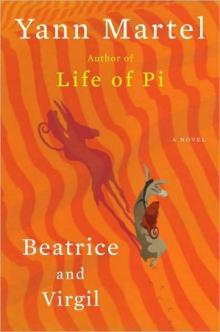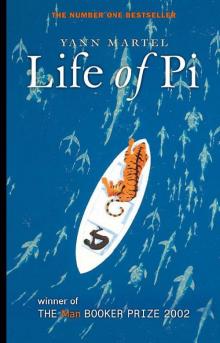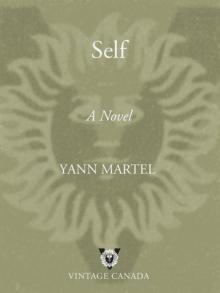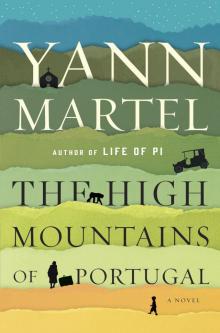- Home
- Yann Martel
Life of Pi Page 7
Life of Pi Read online
Page 7
This Son, on the other hand, who goes hungry, who suffers from thirst, who gets tired, who is sad, who is anxious, who is heckled and harassed, who has to put up with followers who don't get it and opponents who don't respect Him--what kind of a god is that? It's a god on too human a scale, that's what. There are miracles, yes, mostly of a medical nature, a few to satisfy hungry stomachs; at best a storm is tempered, water is briefly walked upon. If that is magic, it is minor magic, on the order of card tricks. Any Hindu god can do a hundred times better. This Son is a god who spent most of His time telling stories, talking. This Son is a god who walked, a pedestrian god--and in a hot place, at that--with a stride like any human stride, the sandal reaching just above the rocks along the way; and when He splurged on transportation, it was a regular donkey. This Son is a god who died in three hours, with moans, gasps and laments. What kind of a god is that? What is there to inspire in this Son?
Love, said Father Martin.
And this Son appears only once, long ago, far away? Among an obscure tribe in a backwater of West Asia on the confines of a long-vanished empire? Is done away with before He has a single grey hair on His head? Leaves not a single descendant, only scattered, partial testimony, His complete works doodles in the dirt? Wait a minute. This is more than Brahman with a serious case of stage fright. This is Brahman selfish. This is Brahman ungenerous and unfair. This is Brahman practically unmanifest. If Brahman is to have only one son, He must be as abundant as Krishna with the milkmaids, no? What could justify such divine stinginess?
Love, repeated Father Martin.
I'll stick to my Krishna, thank you very much. I find his divinity utterly compelling. You can keep your sweaty, chatty Son to yourself.
That was how I met that troublesome rabbi of long ago: with disbelief and annoyance.
I had tea with Father Martin three days in a row. Each time, as teacup rattled against saucer, as spoon tinkled against edge of cup, I asked questions.
The answer was always the same.
He bothered me, this Son. Every day I burned with greater indignation against Him, found more flaws to Him.
He's petulant! It's morning in Bethany and God is hungry; God wants His breakfast. He comes to a fig tree. It's not the season for figs, so the tree has no figs. God is peeved. The Son mutters, "May you never bear fruit again," and instantly the fig tree withers. So says Matthew, backed up by Mark.
I ask you, is it the fig tree's fault that it's not the season for figs? What kind of a thing is that to do to an innocent fig tree, wither it instantly?
I couldn't get Him out of my head. Still can't. I spent three solid days thinking about Him. The more He bothered me, the less I could forget Him. And the more I learned about Him, the less I wanted to leave Him.
On our last day, a few hours before we were to leave Munnar, I hurried up the hill on the left. It strikes me now as a typically Christian scene. Christianity is a religion in a rush. Look at the world created in seven days. Even on a symbolic level, that's creation in a frenzy. To one born in a religion where the battle for a single soul can be a relay race run over many centuries, with innumerable generations passing along the baton, the quick resolution of Christianity has a dizzying effect. If Hinduism flows placidly like the Ganges, then Christianity bustles like Toronto at rush hour. It is a religion as swift as a swallow, as urgent as an ambulance. It turns on a dime, expresses itself in the instant. In a moment you are lost or saved. Christianity stretches back through the ages, but in essence it exists only at one time: right now.
I booted up that hill. Though Father Martin was not IN--alas, his block was slid over--thank God he was in.
Short of breath I said, "Father, I would like to be a Christian, please."
He smiled. "You already are, Piscine--in your heart. Whoever meets Christ in good faith is a Christian. Here in Munnar you met Christ."
He patted me on the head. It was more of a thump, actually. His hand went BOOM BOOM BOOM on my head.
I thought I would explode with joy.
"When you come back, we'll have tea again, my son."
"Yes, Father."
It was a good smile he gave me. The smile of Christ.
I entered the church, without fear this time, for it was now my house too. I offered prayers to Christ, who is alive. Then I raced down the hill on the left and raced up the hill on the right--to offer thanks to Lord Krishna for having put Jesus of Nazareth, whose humanity I found so compelling, in my way.
CHAPTER 18
Islam followed right behind, hardly a year later. I was fifteen years old and I was exploring my hometown. The Muslim quarter wasn't far from the zoo. A small, quiet neighbourhood with Arabic writing and crescent moons inscribed on the facades of the houses.
I came to Mullah Street. I had a peek at the Jamia Masjid, the Great Mosque, being careful to stay on the outside, of course. Islam had a reputation worse than Christianity's--fewer gods, greater violence, and I had never heard anyone say good things about Muslim schools--so I wasn't about to step in, empty though the place was. The building, clean and white except for various edges painted green, was an open construction unfolding around an empty central room. Long straw mats covered the floor everywhere. Above, two slim, fluted minarets rose in the air before a background of soaring coconut trees. There was nothing evidently religious or, for that matter, interesting about the place, but it was pleasant and quiet.
I moved on. Just beyond the mosque was a series of attached single-storey dwellings with small shaded porches. They were rundown and poor, their stucco walls a faded green. One of the dwellings was a small shop. I noticed a rack of dusty bottles of Thums Up and four transparent plastic jars half-full of candies. But the main ware was something else, something flat, roundish and white. I got close. It seemed to be some sort of unleavened bread. I poked at one. It flipped up stiffly. They looked like three-day-old nans. Who would eat these, I wondered. I picked one up and wagged it to see if it would break.
A voice said, "Would you like to taste one?"
I nearly jumped out of my skin. It's happened to all of us: there's sunlight and shade, spots and patterns of colour, your mind is elsewhere--so you don't make out what is right in front of you.
Not four feet away, sitting cross-legged before his breads, was a man. I was so startled my hands flew up and the bread went sailing halfway across the street. It landed on a pat of fresh cow dung.
"I'm so sorry, sir. I didn't see you!" I burst out. I was just about ready to run away.
"Don't worry," he said calmly. "It will feed a cow. Have another one."
He tore one in two. We ate it together. It was tough and rubbery, real work for the teeth, but filling. I calmed down.
"So you make these," I said, to make conversation.
"Yes. Here, let me show you how." He got off his platform and waved me into his house.
It was a two-room hovel. The larger room, dominated by an oven, was the bakery, and the other, separated by a flimsy curtain, was his bedroom. The bottom of the oven was covered with smooth pebbles. He was explaining to me how the bread baked on these heated pebbles when the nasal call of the muezzin wafted through the air from the mosque. I knew it was the call to prayer, but I didn't know what it entailed. I imagined it beckoned the Muslim faithful to the mosque, much like bells summoned us Christians to church. Not so. The baker interrupted himself mid-sentence and said, "Excuse me." He ducked into the next room for a minute and returned with a rolled-up carpet, which he unfurled on the floor of his bakery, throwing up a small storm of flour. And right there before me, in the midst of his workplace, he prayed. It was incongruous, but it was I who felt out of place. Luckily, he prayed with his eyes closed.
He stood straight. He muttered in Arabic. He brought his hands next to his ears, thumbs touching the lobes, looking as if he were straining to hear Allah replying. He bent forward. He stood straight again. He fell to his knees and brought his hands and forehead to the floor. He sat up. He fell forward again. He s
tood. He started the whole thing again.
Why, Islam is nothing but an easy sort of exercise, I thought. Hot-weather yoga for the Bedouins. Asanas without sweat, heaven without strain.
He went through the cycle four times, muttering throughout. When he had finished--with a right-left turning of the head and a short bout of meditation--he opened his eyes, smiled, stepped off his carpet and rolled it up with a flick of the hand that spoke of old habit. He returned it to its spot in the next room. He came back to me. "What was I saying?" he asked.
So it went the first time I saw a Muslim pray--quick, necessary, physical, muttered, striking. Next time I was praying in church--on my knees, immobile, silent before Christ on the Cross--the image of this callisthenic communion with God in the middle of bags of flour kept coming to my mind.
CHAPTER 19
I went to see him again.
"What's your religion about?" I asked.
His eyes lit up. "It is about the Beloved," he replied.
I challenge anyone to understand Islam, its spirit, and not to love it. It is a beautiful religion of brotherhood and devotion.
The mosque was truly an open construction, to God and to breeze. We sat cross-legged listening to the imam until the time came to pray. Then the random pattern of sitters disappeared as we stood and arranged ourselves shoulder to shoulder in rows, every space ahead being filled by someone from behind until every line was solid and we were row after row of worshippers. It felt good to bring my forehead to the ground. Immediately it felt like a deeply religious contact.
CHAPTER 20
He was a Sufi, a Muslim mystic. He sought fana, union with God, and his relationship with God was personal and loving. "If you take two steps towards God," he used to tell me, "God runs to you!"
He was a very plain-featured man, with nothing in his looks or in his dress that made memory cry hark. I'm not surprised I didn't see him the first time we met. Even when I knew him very well, encounter after encounter, I had difficulty recognizing him. His name was Satish Kumar. These are common names in Tamil Nadu, so the coincidence is not so remarkable. Still, it pleased me that this pious baker, as plain as a shadow and of solid health, and the Communist biology teacher and science devotee, the walking mountain on stilts, sadly afflicted with polio in his childhood, carried the same name. Mr. and Mr. Kumar taught me biology and Islam. Mr. and Mr. Kumar led me to study zoology and religious studies at the University of Toronto. Mr. and Mr. Kumar were the prophets of my Indian youth.
We prayed together and we practised dhikr, the recitation of the ninety-nine revealed names of God. He was a hafiz, one who knows the Qur'an by heart, and he sang it in a slow, simple chant. My Arabic was never very good, but I loved its sound. The guttural eruptions and long flowing vowels rolled just beneath my comprehension like a beautiful brook. I gazed into this brook for long spells of time. It was not wide, just one man's voice, but it was as deep as the universe.
I described Mr. Kumar's place as a hovel. Yet no mosque, church or temple ever felt so sacred to me. I sometimes came out of that bakery feeling heavy with glory. I would climb onto my bicycle and pedal that glory through the air.
One such time I left town and on my way back, at a point where the land was high and I could see the sea to my left and down the road a long ways, I suddenly felt I was in heaven. The spot was in fact no different from when I had passed it not long before, but my way of seeing it had changed. The feeling, a paradoxical mix of pulsing energy and profound peace, was intense and blissful. Whereas before the road, the sea, the trees, the air, the sun all spoke differently to me, now they spoke one language of unity. Tree took account of road, which was aware of air, which was mindful of sea, which shared things with sun. Every element lived in harmonious relation with its neighbour, and all was kith and kin. I knelt a mortal; I rose an immortal. I felt like the centre of a small circle coinciding with the centre of a much larger one. Atman met Allah.
One other time I felt God come so close to me. It was in Canada, much later. I was visiting friends in the country. It was winter. I was out alone on a walk on their large property and returning to the house. It was a clear, sunny day after a night of snowfall. All nature was blanketed in white. As I was coming up to the house, I turned my head. There was a wood and in that wood, a small clearing. A breeze, or perhaps it was an animal, had shaken a branch. Fine snow was falling through the air, glittering in the sunlight. In that falling golden dust in that sun-splashed clearing, I saw the Virgin Mary. Why her, I don't know. My devotion to Mary was secondary. But it was her. Her skin was pale. She was wearing a white dress and a blue cloak; I remember being struck by their pleats and folds. When I say I saw her, I don't quite mean it literally, though she did have body and colour. I felt I saw her, a vision beyond vision. I stopped and squinted. She looked beautiful and supremely regal. She was smiling at me with loving kindness. After some seconds she left me. My heart beat with fear and joy.
The presence of God is the finest of rewards.
CHAPTER 21
I am sitting in a downtown cafe, after, thinking. I have just spent most of an afternoon with him. Our encounters always leave me weary of the glum contentment that characterizes my life. What were those words he used that struck me? Ah, yes: "dry, yeastless factuality", "the better story". I take pen and paper out and write:
Words of divine consciousness: moral exaltation; lasting feelings of elevation, elation, joy; a quickening of the moral sense, which strikes one as more important than an intellectual understanding of things; an alignment of the universe along moral lines, not intellectual ones; a realization that the founding principle of existence is what we call love, which works itself out sometimes not clearly, not cleanly, not immediately, nonetheless ineluctably.
I pause. What of God's silence? I think it over. I add:
An intellect confounded yet a trusting sense of presence and of ultimate purpose.
CHAPTER 22
I can well imagine an atheist's last words: "White, white! L-L-Love! My God!"--and the deathbed leap of faith. Whereas the agnostic, if he stays true to his reasonable self, if he stays beholden to dry, yeastless factuality, might try to explain the warm light bathing him by saying, "Possibly a f-f-failing oxygenation of the b-b-brain," and, to the very end, lack imagination and miss the better story.
CHAPTER 23
Alas, the sense of community that a common faith brings to a people spelled trouble for me. In time, my religious doings went from the notice of those to whom it didn't matter and only amused, to that of those to whom it did matter--and they were not amused.
"What is your son doing going to temple?" asked the priest.
"Your son was seen in church crossing himself," said the imam.
"Your son has gone Muslim," said the pandit.
Yes, it was all forcefully brought to the attention of my bemused parents. You see, they didn't know. They didn't know that I was a practising Hindu, Christian and Muslim. Teenagers always hide a few things from their parents, isn't that so? All sixteen-year-olds have secrets, don't they? But fate decided that my parents and I and the three wise men, as I shall call them, should meet one day on the Goubert Salai seaside esplanade and that my secret should be outed. It was a lovely, breezy, hot Sunday afternoon and the Bay of Bengal glittered under a blue sky. Townspeople were out for a stroll. Children screamed and laughed. Coloured balloons floated in the air. Ice cream sales were brisk. Why think of business on such a day, I ask? Why couldn't they have just walked by with a nod and a smile? It was not to be. We were to meet not just one wise man but all three, and not one after another but at the same time, and each would decide upon seeing us that right then was the golden occasion to meet that Pondicherry notable, the zoo director, he of the model devout son. When I saw the first, I smiled; by the time I had laid eyes on the third, my smile had frozen into a mask of horror. When it was clear that all three were converging on us, my heart jumped before sinking very low.
The wise men seemed annoye
d when they realized that all three of them were approaching the same people. Each must have assumed that the others were there for some business other than pastoral and had rudely chosen that moment to deal with it. Glances of displeasure were exchanged.
My parents looked puzzled to have their way gently blocked by three broadly smiling religious strangers. I should explain that my family was anything but orthodox. Father saw himself as part of the New India--rich, modern and as secular as ice cream. He didn't have a religious bone in his body. He was a businessman, pronounced busynessman in his case, a hardworking, earthbound professional, more concerned with inbreeding among the lions than any overarching moral or existential scheme. It's true that he had all new animals blessed by a priest and there were two small shrines at the zoo, one to Lord Ganesha and one to Hanuman, gods likely to please a zoo director, what with the first having the head of an elephant and the second being a monkey, but Father's calculation was that this was good for business, not good for his soul, a matter of public relations rather than personal salvation. Spiritual worry was alien to him; it was financial worry that rocked his being. "One epidemic in the collection," he used to say, "and we'll end up in a road crew breaking up stones." Mother was mum, bored and neutral on the subject. A Hindu upbringing and a Baptist education had precisely cancelled each other out as far as religion was concerned and had left her serenely impious. I suspect she suspected that I had a different take on the matter, but she never said anything when as a child I devoured the comic books of the Ramayana and the Mahabharata and an illustrated children's Bible and other stories of the gods. She herself was a big reader. She was pleased to see me with my nose buried in a book, any book, so long as it wasn't naughty. As for Ravi, if Lord Krishna had held a cricket bat rather than a flute, if Christ had appeared more plainly to him as an umpire, if the prophet Muhammad, peace be upon him, had shown some notions of bowling, he might have lifted a religious eyelid, but they didn't, and so he slumbered.

 Beatrice and Virgil
Beatrice and Virgil Life of Pi
Life of Pi Self
Self The High Mountains of Portugal
The High Mountains of Portugal 101 Letters to a Prime Minister
101 Letters to a Prime Minister